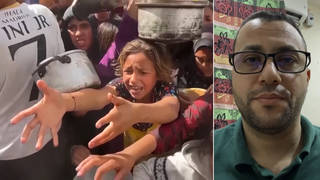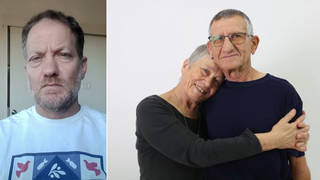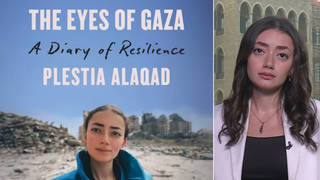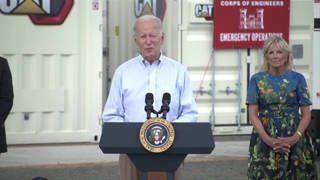
Guests
- Rosa Clementeindependent journalist, just back from Puerto Rico, and 2008 vice-presidential nominee for the Green Party.
Links
In Puerto Rico, residents desperate for drinking water have begun pumping water from the Dorado Groundwater Contamination Site—a hazardous waste Superfund site. The EPA warns the water contains chemicals that cause liver damage and an increased risk of cancer. We speak with Rosa Clemente, just back from Puerto Rico, where she joined other independent journalists in documenting conditions for a project called PR on the Map, including at the Dorado site. She also interviewed San Juan Mayor Carmen Yulín Cruz about her message for the Puerto Rican diaspora.
Transcript
AMY GOODMAN: This is Democracy Now!, as we continue to look at Puerto Rico’s recovery from Hurricanes Maria and Irma, one month since Maria made landfall. This comes as residents desperate for drinking water have begun pumping water from the Dorado Groundwater Contamination Site, a hazardous waste Superfund site. The EPA warns the water contains chemicals that cause liver damage and an increased risk of cancer.
Our next guest, Rosa Clemente, is just back from Puerto Rico, where she joined other independent journalists in documenting conditions for a project called PR on the Map. This is a clip from a video she recorded at the Dorado Superfund site, where she met a woman filling up her water tank.
ROSA CLEMENTE: [translated] Good morning. How are you? You’ve come to fill up water here?
DORADO RESIDENT: [translated] Yes. Everyone is doing it.
ROSA CLEMENTE: [translated] The water doesn’t have chemicals? Or maybe you don’t know?
DORADO RESIDENT: [translated] No, it’s drinkable.
ROSA CLEMENTE: [translated] Drinkable?
DORADO RESIDENT: [translated] Yes, yes, because it comes from that plant, from the—
ROSA CLEMENTE: [translated] But this is called a Superfund site and has chemicals right here. How do you say “in the ground”? Did you know that? That it has chemicals?
DORADO RESIDENT: [translated] Well, it’s drinkable. They are selling it as drinkable. And when you fill the gallons and you bring them home, the water doesn’t look like yellow. And I use it to drink and more.
JUAN GONZÁLEZ: That was Rosa Clemente speaking with a woman filling up her water tank at the Dorado Superfund site in Puerto Rico. And now Rosa joins us in our studio. She was the 2008 vice-presidential nominee for the Green Party, is now a doctoral candidate at the University of Massachusetts Amherst.
Welcome back to Democracy Now! You’ve been in Puerto Rico now for the past 13 days. Tell us what you saw on the ground.
ROSA CLEMENTE: Yeah, well, PR on the Map is an intergenerational, unfiltered group that I put together in less than 10 days, because I knew no one could tell the stories like we could tell.
So, look, the people of Puerto Rico are dying. They want a Puerto Rico without Puerto Ricans. So, from contaminated water to mothers who are not lactating, to babies having to eat mashed bananas because baby food cannot be found, to people getting on ice lines from 3 a.m. in the morning to 1 p.m. waiting for two bags of ice, this is massive violations of human rights. This is a colonial problem that began 119 years ago. And in my opinion, from what we’ve seen, the government has collapsed in Puerto Rico.
And we were able to get to places that the military said they couldn’t get to, in a Kia and a Hyundai Accent, all the way to Aguadilla, Moca, Utuado. People have not even seen one-tenth of what is happening in all these places.
AMY GOODMAN: That Superfund site?
ROSA CLEMENTE: Well, that’s the Superfund site in Dorado. That was a little easier to get to. But the fact that we got to Utuado, to the—I’m sorry, Amy.
AMY GOODMAN: But I mean just the site, that they’re drinking from it.
ROSA CLEMENTE: Oh, yeah. They don’t—the water looks clean, but the hoses that they pick up are in the ground. It’s completely black. We had people—a veteran pull up to us and said, ”Mira, pull up your socks. You know, it’s chemicals.” He said he’s a veteran of Afghanistan and Iraq, and he has never seen the level of incompetence coming from the top all the way through the municipalities.
JUAN GONZÁLEZ: I think that’s an important point, because during Katrina, there was a lot of criticism of the local government—
ROSA CLEMENTE: Yeah.
JUAN GONZÁLEZ: —the mayor, [Nagin], and the governor. But in Puerto Rico, really, this government has totally failed the local government—the newly elected governor—to deal with the crisis.
ROSA CLEMENTE: Well, that—two days ago, he was at a concert in Miami with Jennifer Lopez and Marc Anthony, raising money for his wife’s fund. He also recently made an agreement with a private electrical company based in Montana, that has no record of how to build a power grid. Ninety percent of the island, Juan, is still without electricity. And much of what we see, too, is San Juan, who relatively is doing well.
AMY GOODMAN: Let’s turn to San Juan Mayor Carmen Yulín Cruz, her message to the Puerto Rican diaspora, the many Puerto Ricans living here in New York, in Florida, across the United States.
MAYOR CARMEN YULÍN CRUZ: When you are more than 50 years old, you’re afforded the opportunity of getting a little emotional. So I will say this the only way I know how to say it. To the young people out there, the diaspora: Coño, no nos dejen solos, usen su voz para que sean el eco de nuestras voces. Without you, we are done. The world will not know what is happening here, because the twists and turns of a man that knows nothing more but to tweet his hate away will take over. And we cannot let that happen. So it’s on us, but it’s on you, because, after all, we’re one nation. One nation.
JUAN GONZÁLEZ: That was the San Juan mayor, Carmen Yulín Cruz, in an interview with our guest, Rosa Clemente, for the project PR on the Map. Rosa, if you could talk about that? Because Carmen Yulín Cruz has been a target of President Trump for daring to question the relief effort of the federal government.
ROSA CLEMENTE: Yeah.
JUAN GONZÁLEZ: Could you talk about her role?
ROSA CLEMENTE: Yeah. First, let’s just say that 45 is a megalomaniac white supremacist, and that’s what we’re dealing with, plain and simple. But Carmen Yulín Cruz has been—has become de facto the leader of Puerto Rico. She’s also the voice for the mayors that, to this day, have not received walkie-talkies, People might not understand, there’s 78 municipalities in Puerto Rico. That’s a political problem. There’s 77 mayors, and Mayor Cruz has become kind of the leader of Puerto Rico. She gave us an audio interview the day before, while she was getting a respiratory breathing thing, because she’s so overworked. And that next day, she gave us over an hour, and that exclusive video will drop on Friday. But there have been a little bit of critiques from, I think, people in San Juan who are saying she’s going to other places. But when we have more an extended conversation, we go, “Well, maybe because the mayors are completely isolated.” There is no FEMA.
When we were in Utuado, we went to the FEMA location. They weren’t trying to tell us where it was. There’s no signage of how to get there. A national guard, off the record, said, “Go here, go here.” We got there. There were over 40,000 meals that had not been distributed to the people in Utuado, but there was a complete military occupation of that town. And people said, “Why?” We asked, “Why do you think?” They said, “There’s copper. There’s potential uranium in these mines. And they want to take this city, you know, this part of the island, for that.”
AMY GOODMAN: You bumped into National Nurses United volunteers—
ROSA CLEMENTE: Yes.
AMY GOODMAN: —from the mainland?
ROSA CLEMENTE: We were at a press conference, and they were incensed. It was all types of different nurses.
AMY GOODMAN: Let’s go to a clip.
MISTY, NATIONAL NURSES UNITED: How do I tell a mom whose 2-year-old can’t stop the diarrhea not to give her 2-year-old water because that’s what’s making her sick? And I don’t have anything to offer them. There’s no one coming. She lives up on a mountain using a car battery for electricity to try and put a fan on the baby. A car battery.
AMY GOODMAN: She was?
ROSA CLEMENTE: One of the many nurses that were there. One of the things that they’re saying is that they’re actually feeling a—fearing a cholera outbreak, the leptospirosis from all the rats, dead animals, that’s in the water. As well, they let us know that the U.S.S. Comfort, that is there, that can hold 3,000 patients—
AMY GOODMAN: The ship, the hospital boat.
ROSA CLEMENTE: The ship, the hospital, at the present moment, has 16 people in it. And from personal experience, my aunt was in a hospital in Bayamón. They let me in with a hazmat suit to see her for 10 minutes. And the nurse said, “Unless you’re dying, even if you have an infection that can kill you, we cannot have surgery, because we don’t have water.” People need to be evacuated, and the Comfort sits there now with less than 20 people out of 3,000.
JUAN GONZÁLEZ: Total mismanagement that is going on.
ROSA CLEMENTE: I think it’s more. I don’t think it’s as nefarious as a conspiracy. I think that, as Puerto Ricans, we’ve been some—an island and a people that they have extracted from us, and now they want to extract all of us from the island.
AMY GOODMAN: And you have President Trump tweeting, “We cannot keep FEMA, the Military & the First Responders, who have been amazing (under the most difficult circumstances) in P.R. forever!”
ROSA CLEMENTE: Well, I saw them partying at the Sheraton one night with a DJ playing the “Macarena,” hundreds and hundreds of FEMA, military, everywhere, having a good time—two miles where people still don’t have food and water.
AMY GOODMAN: Well, we will continue to cover this catastrophe that is Puerto Rico right now. Rosa Clemente, just back from Puerto Rico, independent journalist, 2008 vice president nominee for the Green Party. We’ll link to her project at PROnTheMAP.com.
When we come back, the firefighters fighting the fires in Northern California, among them a number of prisoners. We’ll talk about the women prisoners on the fire front lines. Stay with us.
[break]
AMY GOODMAN: “Freedom is Free,” by the L.A.-based band Chicano Batman, performing here from their new album here in the Democracy Now! studios.












Media Options